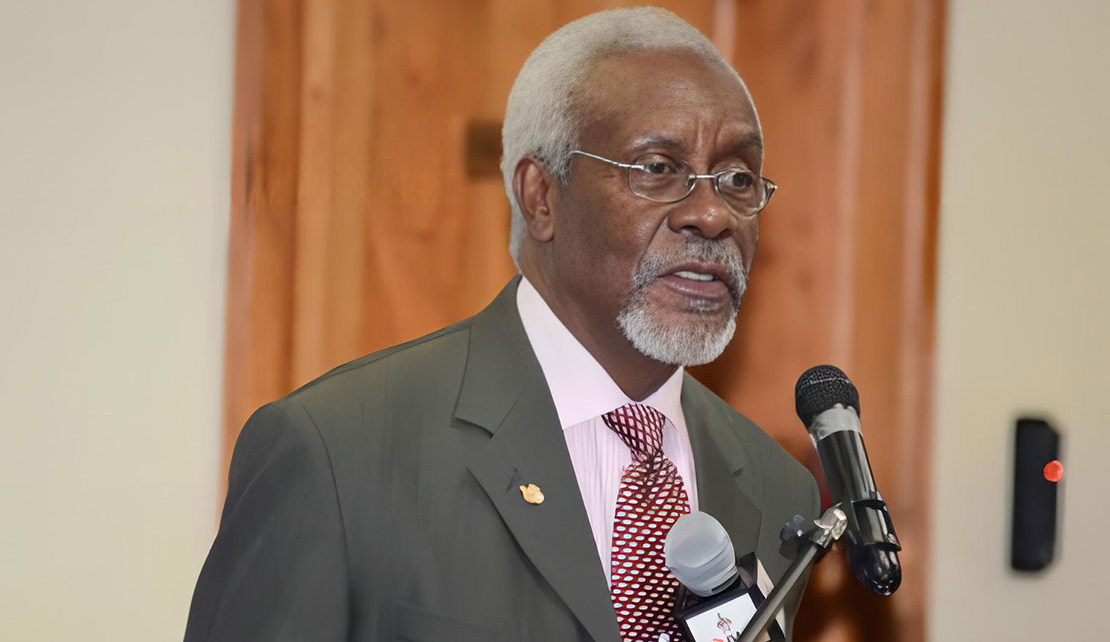JAMAICA | Re-energizing Caribbean Development: A Vision for the Future

KINGSTON, Jamaica, November 16, 2023: -Former Prime Minister and Statesman in Residence at the PJ Patterson Institute for Africa Caribbean Public Advocacy, PJ Patterson, has once again illuminated a path for the Caribbean’s ascent in the global economy
Addressing a private Knowledge Forum at the Regional Headquarters of the University of the West Indies (UWI), on November 8, his speech, a tapestry of insights and imperatives, Mr. Patterson outlined the critical areas that beckon immediate action: Climate Change and Sustainable Development, Energy, Regional Transportation, Agriculture and Food Security, the Knowledge Economy, and the revitalization of the Association of Caribbean States.
Patterson, a titan of Caribbean unity and progress, took center stage at a private Knowledge Forum on November 8, jointly organized by the UWI and the Development Bank of Latin America and the Caribbean (CAF).
His words, resonating with the wisdom of a seasoned leader, served as a clarion call for deeper regional integration and innovation. He traced the Caribbean's historical impact on the world, stating, “The formation of the Caribbean Community was the inaugural moment of the making of the modern world,” reminding the audience of the region's indelible mark on global history.
Charting a Course for Collaborative Excellence:
The Statesman in Residence tasked the UWI and CAF with spearheading a movement towards stronger regional integration, extending to Latin America. His vision: a re-energized Association of Caribbean States (ACS), no longer dormant but dynamic, driven by political will and commitment.
He envisioned the ACS as a cornerstone for a unified Caribbean, urging CAF to extend its lending schemes and galvanize support among its Member Countries, thereby breathing new life into the ACS.
Priorities That Demand Immediate Attention:
In a region where the azure embrace of the oceans is a lifeline, Patterson underscored the urgency of addressing Climate Change and Sustainable Development. He depicted a Caribbean at the mercy of capricious weather patterns – shorter wet seasons, prolonged droughts, and escalating temperatures, all threatening the rich tapestry of marine life and biodiversity. Patterson, with the sagacity of a sage, called for heightened awareness and action on climate finance, recognizing the Caribbean's vulnerability to natural disasters and the disproportionate impact on its economy and cultural fabric.
The dialogue then turned to Energy and Sustainable Development. Patterson, balancing caution with foresight, advocated for a shift from fossil fuel dependency, even as nations explore lucrative petroleum reserves. He highlighted the importance of balancing economic growth with environmental stewardship, pointing to initiatives like Suriname’s renewable energy fund. His appeal to the UWI and CAF was clear: champion research and investment in renewable energies, such as solar and wind power, to curtail the region's reliance on fossil fuels.
The Lifelines of Connectivity: Transportation: Transportation, a cornerstone of economic integration, was Patterson's next focus. He emphasized the quintessential role of efficient sea and air transport in realizing the Caribbean's economic potential. Recognizing the region's unique geography – an amalgamation of islands connected and divided by the sea – he urged CAF to prioritize investment in intra-regional transportation infrastructure, a vital link in the chain of Caribbean unity and prosperity.
Empowering Agriculture and Food Security: Patterson, echoing the prowess of legendary West Indies cricketers, made a strong pitch for enhancing food security. He championed the movement led by Guyana’s President to slash the region's food import bill by 25% by 2025, amidst rising costs and unique topographical challenges.
Patterson implored the UWI and CAF to join forces in research and investment to achieve this ambitious goal, calling on CARICOM nations to allocate at least 5% of their GDP towards bolstering food production infrastructure.
Igniting the Knowledge Economy:
Turning to the Knowledge Economy, Patterson urged the Caribbean to seize its untapped potential in this arena. He reminded the audience of the transformative power of ICT, particularly evident during the COVID-19 pandemic, which demonstrated how technology could keep communities connected, learning, and thriving.
Advocating for a paradigm shift in traditional management, education, and training, he highlighted the need for a more flexible, dynamic approach, rooted in the rich history of Caribbean innovation and creativity.
Envisioning a United and Thriving Caribbean:
In his impassioned conclusion, Patterson encouraged the UWI to steadfastly continue its vital role in human resource development, in collaboration with regional universities.
Mr. Patterson called on CAF, now wielding financial assets of $50 billion, to facilitate funding through public-private partnerships, aiding the Caribbean in its quest for deeper integration and sustainable development. His final charge was a call to regional leaders to transcend insularity, shed the remnants of colonialism, and unite in unlocking the Caribbean’s boundless potential.
